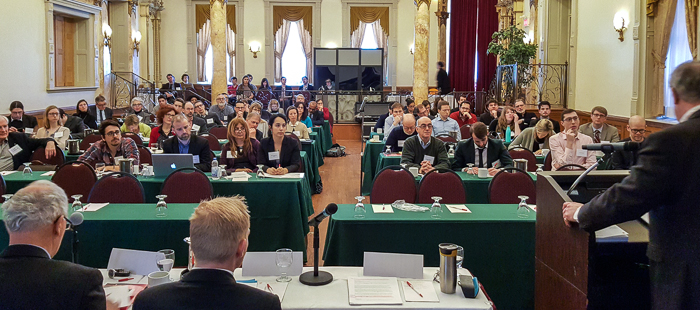
On March 23-24, 2017, federalism experts from across Canada and the world gathered at a conference marking the 150th anniversary of the Canadian confederation. Participants met in Montreal, Quebec City, and on a train travelling between the two.
Un service d’interprétation simultanée a par ailleurs contribué au caractère entièrement bilingue de cet événement, qui était co-organisé par l’Université McGill (Johanne Poirier), l’Université du Québec à Montréal (Alain G. Gagnon) et l’Université Laval (Eugénie Brouillet et Guy Laforest) , sous l’égide du Groupe de recherche sur les sociétés plurinationales et de la Chaire MacKell sur le fédéralisme.
Montréal: Bicameralism and the Judicial Power in Federal Systems
In her opening remarks, Johanne Poirier (McGill U.) noted that if 150 years of confederation was not, in itself, a reason to celebrate, the anniversary was nonetheless an opportune moment for collective reflection, after years of “constitutional paralysis and taboos”. The first panel focused on the Canadian Senate from a comparative and critical perspective. Cheryl Saunders (U. Melbourne) described bicameralism as “an institution for shared-rule where constituent units might be given a voice,” and which can be adapted to reflect gender and minorities, as well as Indigenous peoples. Jörg Broschek (Wilfrid Laurier U.) argued that the weakness of joint-rule institutions in Canada led to greater autonomy and decentralisation.
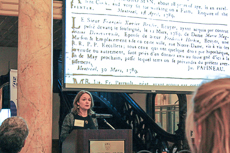 |
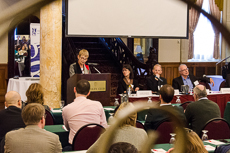 |
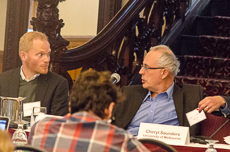 |
For his part, Ian Peach (UNB) called for the abolition of the Canadian Senate as it currently stands and the fashioning of a new second chamber from the Council of the Federation. Meanwhile, Linda Cardinal (U. Ottawa) underlined the risks of a radical abolition, by emphasising how a non-elected Senate has played a fundamental role in representing and defending the interests of minorities, particularly francophones from outside Québec, right from the start. Former Supreme Court Justice Marie Deschamps joined the panelists to discuss the role of the judiciary in federal systems. Marc Verdussen (U. Louvain) explored the impact of constitutional case law on the evolution of Canadian and Belgian federalism, while Sébastien Grammond (U. Ottawa) identified a contractual conception of the Canadian Constitution in the Supreme Court’s analysis.
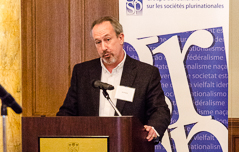 |
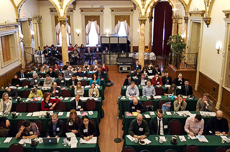 |
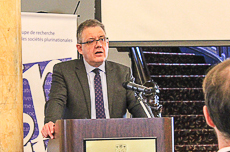 |
En train: Les perspectives autochtones sur le fédéralisme canadien
The conference then moved to a different, unusual, and symbolic venue to discuss Indigenous perspectives on Canadian Federalism: a train car was chartered to bring around 50 participants, including international scholars and McGill students, to Quebec City. Acknowledging that the group was travelling from Mohawk to Abenaki to Huron-Wendat traditional lands and territories, Daniel Salée (Concordia U.) facilitated a “moving conversation” on the relationship between Canada and Indigenous peoples. Ghislain Picard, Chief of the Assembly of First Nations of Quebec and Labrador reminded participants that Canada was built on a history of protests and claims of recognition by Indigenous peoples. Ry Moran, Director of the Centre for Truth and Reconciliation in Winnipeg, stressed that reconciliation can only be built from a moral sense of duty shared by all parties involved in the process, while Janique Dubois (U. Ottawa) noted that only recognizing that “we are all treaty people” will allow us to move towards reconciliation.
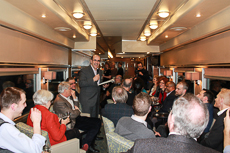 |
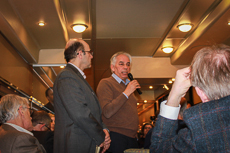 |
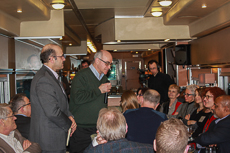 |
Québec: Systèmes électoraux, relations intergouvernementales et regards prospectifs sur le fédéralisme canadien
La deuxième journée du colloque, se déroulant au Musée de la civilisation de Québec, abordait quant à elle les systèmes électoraux et les relations intergouvernementales. Le premier panel a débuté par une analyse comparative de la démocratie et du parlementarisme dans les fédérations canadienne et allemande par Arthur Benz (U. Darmstadt). Brian Tanguay (U. Wilfrid Laurier) a ensuite défendu un modèle de représentation proportionnelle mixte. Concluant le premier segment, Yasmeen Abu-Laban (U. Alberta) a dépeint deux conceptions du Canada, celle d’un pays ouvert et multiculturel en quête de réconciliation avec les Peuples autochtones et celle d’un Canada historiquement “fermé” à la diversité.
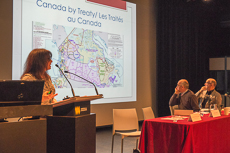 |
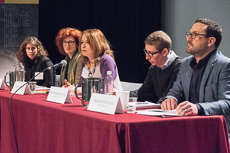 |
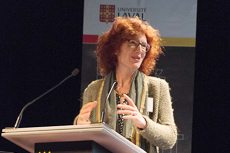 |
En après-midi, les participants ont abordé le thème du fédéralisme et des relations intergouvernementales. Eva Maria Belser (U. Fribourg) a contrasté l’expérience suisse et canadienne en matière de gouvernance conjointe. Martin Papillon et Jean-Philippe Gauvin (UdeM) ont, quant à eux, déploré l’opacité des relations de nature administrative entre différents ordres de gouvernements. Enfin, Noura Karazivan (UdeM), a exploré les concepts de fédéralisme dualiste et de fédéralisme coopératif et souligné les tensions entre ce dernier et le principe de la souveraineté parlementaire.
La table-ronde de clôture invitait à porter des regards extérieurs et prospectifs sur le fédéralisme canadien (« from the outside, looking in »). Rohan Edrisinha, conseiller politique en aménagement institutionnels au Département des affaires politiques à l’ONU a souligné que l’idée fédérale séduit dans les sociétés « post-conflits » ou en voie de réconciliation parce qu’elle promeut l’autonomie de groupes souvent victimes de domination, mais ce, trop souvent, au détriment de « liens qui unissent ». Pour sa part, Marie-Joëlle Zahar (UdeM) a expliqué que la construction de systèmes fédéraux intervient trop souvent dans le contexte de crises intenses, moment peu propice aux compromis que nécessite toute réforme d’envergure. Enfin, Hoi Kong (U. McGill) a savamment synthétisé l’ensemble des exposés, en tissant le fil d’Ariane qui les reliait.
Le Ministre Jean-Marc Fournier, responsable des Relations intergouvernementales et de la Francophonie canadiennes au gouvernement du Québec, a prononcé l’allocution de fermeture rappelant certaines avancées, et les défis, auxquels fait face le fédéralisme canadien.
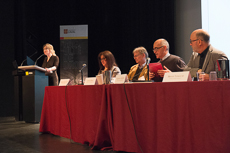 |
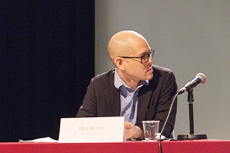 |
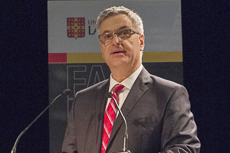 |
Le fédéralisme canadien et son avenir : Acteurs et institutions | Canadian Federalism and its Future: Actors and Institutions: www.federalism150conference.ca
Texte rédigé par Éléna Drouin, Sajeda Hedaraly et Scott Whitelaw.
Photos par Lysanne Larose, Dave Guénette.
